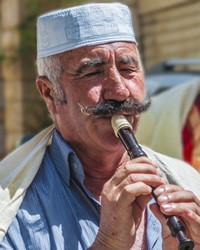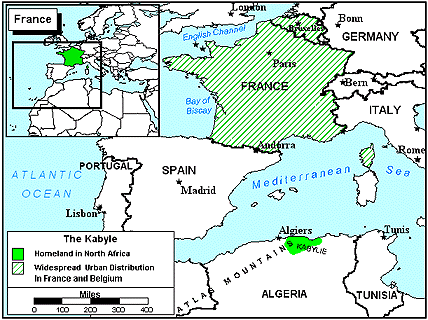The Kabyle are a North African Berber tribe located primarily in Morocco, Tunisia, western Libya, and the coastal mountain regions of northern Algeria. The Africans call this entire region of North Africa Maghrib. During the third century, the Romans named the people of the Maghrib Berber, which means "barbarian."
The Kabyle live in the rugged, well-watered al-Quabail Mountains. These inaccessible peaks (some as high as 7,000 feet) have long been a refuge for the Berbers, forming a base of resistance against the Romans, Vandals, Byzantine, and Arabs. A passion for independence is deeply ingrained in Berber culture.
In the 19th century, France made most of the Kabyle Berber homeland part of their colonial empire. Though the French annexed and settled these North African lands, they also had some of the Kabyle Berbers come to France. For some, service in the army and working in the factories of France during World War I were avenues of migration. When the war ended, many remained in France. Others arrived after World War II when there was a labor shortage in France.
As the number of immigrants in France increased, so did various kinds of problems with housing and unemployment. Initially, the immigrants were males who lived in low-standard hostels and worked at low-paying jobs such as construction, street cleaning, mining, or heavy work in steel assembly. With the beginning of economic stress in 1974, many French began to reclaim these jobs; thus, the government began to restrict immigration. This situation has fluctuated a couple of times through the decades depending on France's need for cheap labor and the needs of North Africans to leave their country because of economic or political instability. Decades of immigration have left a large community in France.
As the number of immigrants in France increased, so did various kinds of racial discrimination, including problems in housing and unemployment. The Kabyle Berbers and other immigrants still face these problems in France.
Preserving the family is important to the Kabyle. Even when a family member is forced by economic or social reasons to migrate to other countries, family ties remain strong. Family bonds are also strengthened by their marriage customs and inheritance rights. Often, an entire family lives in one small room, sharing everything. The father is the head of the family, and the family ancestry is traced through the males even for those who live in Europe.
Immigrant groups in France tend to live in their own ethnic enclaves where they retain their culture and language. The younger generations, who were born and raised in France, are only partially enculturated. They join the ethnic French in sporting events, and some have French friends. For the most part, they retain their own language. Few would dare to marry someone outside their ethnic group.
Although the Kabyle are practically all Muslims, they still retain many of their traditional beliefs, such as saint worship. They usually celebrate the Muslim holidays, visiting friends and neighbors during these festive times. Weddings are lengthy celebrations that often last several days.
Partly because of their hostility towards the Arabs, and partly because of their independent nature, there are more Kabyle Berbers who follow Christ than members of most other Muslim ethnic groups.
Many Kabyle are searching for answers beyond Muslim practices. Those in North Africa do not have the freedom to follow Christ, but those in France do. Although a number have responded to recent Christian programs produced in France, there are still many who remain unreached.
The full Bible and the JESUS Film are available to the Kabyle in their own language. Who will befriend the Kabyle Berbers and share these resources with them?
Ask the Lord to burden the hearts of French Christians for the Kabyle who live among them.
Pray that the JESUS Film will effectively reveal the person of Jesus to the Kabyle community in France.
Ask the Lord to save key leaders among the Kabyle who will boldly declare the gospel.
Pray that signs and wonders will follow the Kabyle believers as they share Christ with their families and friends.
Ask God to raise up prayer teams who will begin breaking up the soil through worship and intercession.
Scripture Prayers for the Berber, Kabyle in France.
https://en.wikipedia.org/wiki/Berbers_in_France
https://en.wikipedia.org/wiki/Kabyle_people
https://www.centrederechercheberbere.fr/kabyle.html
| Profile Source: Joshua Project |












